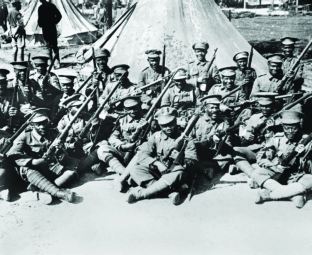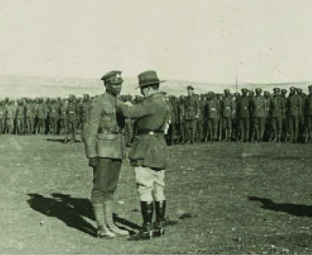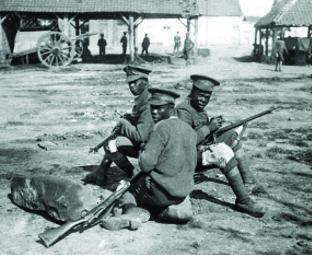I joined the West India Committee having worked in politics after leaving university. On starting at the organisation, I embarked upon a task that would uncover a part of West Indian heritage that has to this day remained in the shadows of history. For almost a century, the story of the British West Indies Regiment (BWIR) has been largely untold and missing in the public’s understanding of the First World War. Commemoration and recognition of the sacrifices of 16,000 men has been non-existent in Britain to this day, besides mentions in the Commonwealth War Graves Commission Debt of Honour.
A soldier’s sacrifice should never be forgotten. Whether this soldier came from Berkshire or Bermuda, it is our responsibility to remember those who defended what was to them their King and Country, and thus allow us today to live in a free and democratic society.
The 16,000 who left the British West Indies did so enthusiastically, with the vast majority of them enlisting voluntarily and doing so with the idea that they would defend their fellow countrymen and the Empire. This mirrored the enthusiasm with which the war was met in Europe. Caribbean men saw the declaration of war as an opportunity to experience adventure, to prove their loyalties and a chance to change their lives. Militarist thinking, like in Britain, was powerful concept in West Indian society at the time but historians still argue about what motivated the volunteers.
At the outbreak of war the region also donated millions of pounds worth of goods to Britain. These donations were made despite the region experiencing severe hardship in years prior, enduring hurricanes and economic hardship. Women played an important role in the Caribbean home front, with ladies’ committees being established on every island. Goods flowed into Europe from the region and this continued throughout the war. The committees were so successful and effective that some islands considered passing legislation to make them permanent.
The war for the Caribbean lasted for three years, and while the home front was sheltered from the worst effects of the conflict, the men on the ground in Europe and the Middle East experienced hardship and injustice. In 1918 the soldiers of the BWIR mutinied. Despite fighting on the Western Front in France and Belgium, on the borders of and within the Ottoman Empire (Palestine, Mesopotamia, Egypt) and in East Africa, the mutiny overshadowed their service and many were imprisoned. Mutiny was widespread during the final years of the war as the conflict dragged on and then as demobilisation was sluggishly executed. The great difference between the BWIR mutiny and others rest with the repercussions, the actions of the government were drastic. The authorities decided that as an extra punishment, the men would be excluded from the Victory Parade in London and were not allowed to be publicly welcomed on their return to the Colonies. No commemorations at home or abroad, they were to return to the West Indies and back to colonial life. Such a harsh psychological chastisement was indeed severe but so was the resentment that grew in reaction. The mutiny was the culmination of years of mismanagement and mistreatment, but was also the beginning of Caribbean anti-colonial sentiment. The authorities were fearful of the potential destabilisation that emboldened soldiers could bring to the status quo in the region. It was an act of preservation: the stability of the British Empire was paramount.
An exploration into the beliefs of these men was necessary to understand their actions in 1918. They joined up to fight for Britain, keen to defend an empire that they truly believed they were a part of as a respected people. This illusion was shattered as soon as they left the Caribbean. Historian Peter Fraser has described the war as “a bog into which flowed an idealised loyalty to Britain and an innocent belief in the justice of the British people and out of which flowed more realistic, jaundiced and cynical views of the true nature of the Imperial connection”. These illusions were, as in much of the empire, essential in maintaining British authority. The war accidentally disproved those powerful myths of respect and appreciation: the Caribbean began to rethink its relationship with Britain.
A key component of West Indian loyalty to Britain and the wider empire was the Monarchy. Monarchy was a powerful and binding symbol in the region, contemporary West Indians felt a strong sense of loyalty to King George V. These men offered their lives for the King-Emperor who personally intervened after Lord Kitchener and the war apparatus’ initial rejection of Caribbean troops. He did so via a call to arms where he personally called on colonial troops to enlist, doing so without informing the government.
The regiment was praised by the high command in combat, and lived up to their own expectations of soldierly conduct. However, they suffered contempt, racial abuse and were referred to and treated as “native troops”. The term “native” being particularly upsetting to Edwardian West Indians, especially when considering cultural and socio-economic aspirations of the time. After fighting had ceased in Palestine, Major-General Sir F.W. Chaytor statement at the end of the conflict demonstrates not only the relationship between commander and soldier, but also the camaraderie that brought down barriers. He stated in 1918; “The bearing of these two Battalions (1st and 2nd B.W.I. Regiment) was excellent throughout the period. In the trenches their discipline was of a high standard, and great enterprise was displayed by their patrols. During the operations they displayed great steadiness under fire and dash in the attack, and gave proof of marching power of a high order.”
Men like Chaytor and King George V recognised that sacrifices were equal. They recognised the importance of the colonies in delivering victory, and were forward thinking enough to understand that race would not determine ability. Unfortunately, demoralisation severely provoked the regiment when stationed in Italy during 1918. When in Taranto, the location of the mutiny, South African Brigadier-General Carey Bernard enthusiastically degraded the men, unsympathetic to reasoning like the fact that they had fought for the same cause. This came after years of unjust treatment by the War Office who failed to provide them with an equal quality of clothing, healthcare and pay.
Today it is our goal to reveal and explain this hitherto hidden heritage, to clear the clouds on the subject and to honour the British West Indies Regiment dutifully. It is not only important for the fallen, but sharing sharing their story with the nations may act as a strong demonstration to the diaspora that it was their ancestors who fell for our freedom as much as anyone elses. It will also function to as a reminder that we fought together for a common cause. We cannot allow another century to pass as the memory of 16,000 men disappears from the annals of history. We will show how these men loyally served King and Country, we will tell their story and display them as the heroes they would have aimed to be. The project itself is titled “The Caribbean’s Great War: The West India Committee’s Unique Perspective”, as it was in fact we who organised their mobilisation, looked after them and defended their interests, fighting for enlistment and fighting for equal pay: always looking after the Regiment. Fascinatingly, the entire Caribbean war effort during the First World War was conducted in the West India Committee Rooms. Queen Mary actually set up a knitting circle in the offices. Fascinating history is emerging as I delve into this, and I look forward to sharing with everyone our findings and final project.
Author: Andreas Persson
11th June 2014



